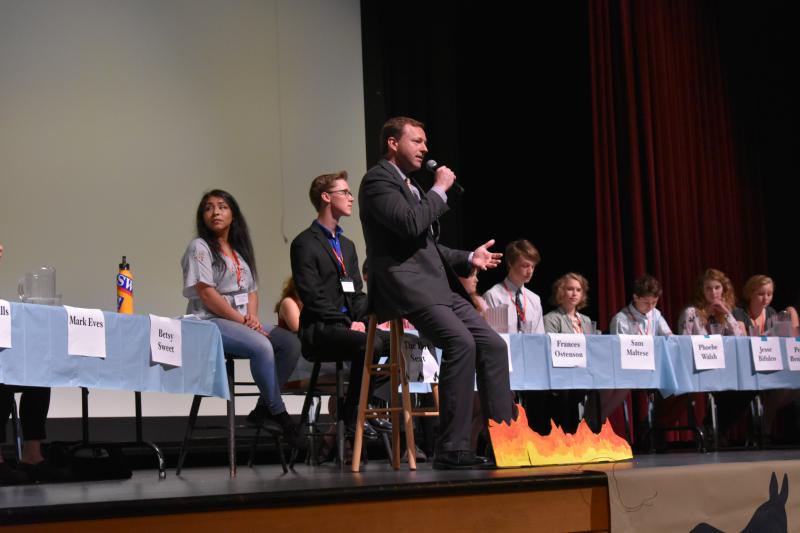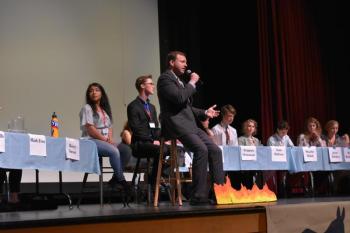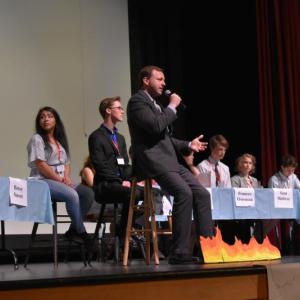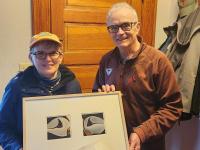Teens grill gubernatorial candidates on variety of topics, including guns
 Gubernatorial candidate Mark Eves sits in the Hot Seat during a rapid-fire questioning by Camden Hills Regional High School students. (Photo by Sarah Thompson)
Gubernatorial candidate Mark Eves sits in the Hot Seat during a rapid-fire questioning by Camden Hills Regional High School students. (Photo by Sarah Thompson)
 Gubernatorial candidate Mark Eves sits in the Hot Seat during a rapid-fire questioning by Camden Hills Regional High School students. (Photo by Sarah Thompson)
Gubernatorial candidate Mark Eves sits in the Hot Seat during a rapid-fire questioning by Camden Hills Regional High School students. (Photo by Sarah Thompson)
ROCKPORT – Democratic candidates for governor held their own against a panel of teens, Saturday, May 26, at Camden Hills Regional High School. The level of depth and directness of the teens caught some candidates off guard, forcing them to respond, and in some cases defend themselves, while an audience of adults listened acutely.
Betsy Sweet, Mark Eves, Janet Mills, Mark Dion, Diane Russell, Adam Cote, and Donna Dion each presented a one-minute opening statement before taking the Hot Seat for ten minutes of student-created questions tailored specifically to the youths’ knowledge of the candidate. Several questions were asked of each candidate, with only 1.5 minutes allowed for each response.
Having done their homework, the teens grilled them on a wide variety of issues affecting Mainers, including the Paris Accord, Penobscot Tribe sovereignty, environment, student debt, and economic rehabilitation.
Based on the facial expressions of the 11 teens, referred to by candidate Diane Russell as the Lockdown Generation, their primary concern appeared to be assault weapons.
“How do you justify being the only democrat to not support the assault weapons ban on clips/magazines exceeding 10 rounds in capacity?” one teen asked State Attorney General Janet Mills.
Mills said she was not the only democrat not supporting the bill. Then clarified that she did not oppose it either. She supports feasible regulations of military-style assault weapons, and would like to learn further what specific guns would be included in the category.
She said that as an advocate for domestic abuse victims, she helped fight for Sen. Mark Dion’s Red Flag bill. Dion’s bill, which he explained earlier in the discussion, would allow police and family members to petition the court for the removal of an individual’s fire arms if that individual appears to be on a downward trajectory.
“That’s the first and foremost thing that we can do to protect students and schools, to protect victims of domestic violence, and to prevent suicides,” Mills said.
Two questions later, a different student alluded to an A-grading Mills received by the NRA. Mills said that the grading had nothing to do with guns. Instead, according to her, the exact wording was as follows: “Janet Mills supported no net loss of hunting land on state-owned property.”
Adam Cote, on the other hand, garnered a round of applause from the audience when he said: “There’s no need for anybody to have the same fire power, that I had in Iraq and Afghanistan, here in Maine....And arming teachers is the wrong approach.”
As a future leader in the legislature, Cote said he would also deal with the lack of school resource officers, have real background checks without loopholes, and demand proper assessment and training for gun owners.
Other statements during the forum drew applause as well, beginning with student Maine Teen Advocacy Coalition founder Pearl Benjamin, who mentioned the four female and three male candidates on stage.
“That makes it a female-majority primary race, and that’s what we need,” she said.
When Mark Eves was asked whether Maine should join other states in promising to follow the Paris Accord, he only had to answer yes to trigger applause. Eves said that under the current governor, Maine has lost a lot of ground in this field.
“We used to be leaders in this, and we can be again. We can be the first state in the nation to be 100 percent renewable and create more energy than we produce,” he said. “Solar and offshore wind, those are our opportunities. We need to reclaim our space on the national and global stage.”
Yet even a simple question drummed a few claps, such as one posed to Janet Mills: How do you plan to repair tensions between yourself and the Native American tribes on the Penobscot River?
Mills said, “I’d rather get things done by communication than litigation.”
She said that as Attorney General, her job is to defend the state, even in circumstances she’d rather not deal with. According to her, state law allowed access to the Penobscot River by all people, without any dispute to the right of substance fishing by tribal members.
In a different role as governor, Mills proposes to form new partnerships with all four tribes.
Mills also garnered laughs when responding to a different question: When stating passion for government transparency, despite not running a clean election, how do you feel about bringing money into politics?
Transparency, she said, is not the same as Clean Elections. Mills said she was warned that a candidate can’t rely on funding.
But, since the teen had demanded transparency, Mills obliged. This time around, Mills’ corporate sponsors are The Dug Out Bar and Grill in Farmington, Doggy Day Care in York, and Mills’ hairdresser.
And then there were the serious as well as the unconventional concepts.
One teen asked Russell: What is your plan and steps to fix the Off Shore Tax loophole? And how would the money gained go to ending hunger?
Russell said the tax system is set up to favor one certain demographic. That demographic can legally hide state tax money abroad, resulting in a $10 million loss to the state. One in five children go to bed hungry.
“What is the point of being the richest country in all of human history if we can’t provide basic healthcare and make sure that our kids can eat at night?” she said.
Russell told the audience to imagine investing in local farmers using the $7 million dollars per year needed to close the hunger gap. Farmers can provide foods more nutritious than pasta. Children can learn, and people can be less irritable, because their bellies are full.
Former Mayor of Biddeford Donna Dion was asked: “In your focus to create jobs in Maine, how would you create jobs that pay well and sustain a family?”
Dion said: “What do we do with our small entrepreneurs who are already here and don’t have the capital to invest and expand? Therefore, take some of the federal money that is out there, reinvest it and provide incentive to other entrepreneurs who will then train and assist the struggling businesses.”
She was also asked: In your talk of re-educating the workforce, do you plan to make colleges more accessible to the average Mainer?
Dion spoke of generating interest in trade schools and culinary programs, and getting those alternative schools to create internships with businesses so that high paying jobs in the trades can be filled. This, she said, would redirect future four-year-college students who might otherwise spend time and money on education without clear direction in regards to majors or future.
Mark Eves was asked: “What academic initiatives do you support? Do you think that the common core has been beneficial to the Maine children and educators?”
In response, Eves said he is in support of a robust investment in PreK and vocational training programs.
“We have to make sure those investments are smart and targeted,” he said. “We need to value every pathway for our kids. If kids aren’t going to go to two and four-year colleges, we need to make sure that they graduate high school with an employable credential.”
And finally, Betsy Sweet was asked: “How do you plan to expand Medicare to all Mainers?”
Not only will people remain sick without the insurance, Sweet said, but healthcare is an engine for our economy.
“So many entrepreneurs in the state don’t do the things that they are passionate about, the thing that they are really good at, because they can’t leave their job, to leave the health insurance. So many women stay in relationships that are dangerous, because they are afraid to lose health insurance.”
Step one, she said, is to fund the Medicare expansion. Then advocate for a public healthcare system and education of healthy lifestyles so as to discontinue paying the profits of drug companies.
We are currently not a healthcare system, she said. We are a sick-care system. Companies do well when we are sick.
Event Date
Address
United States























